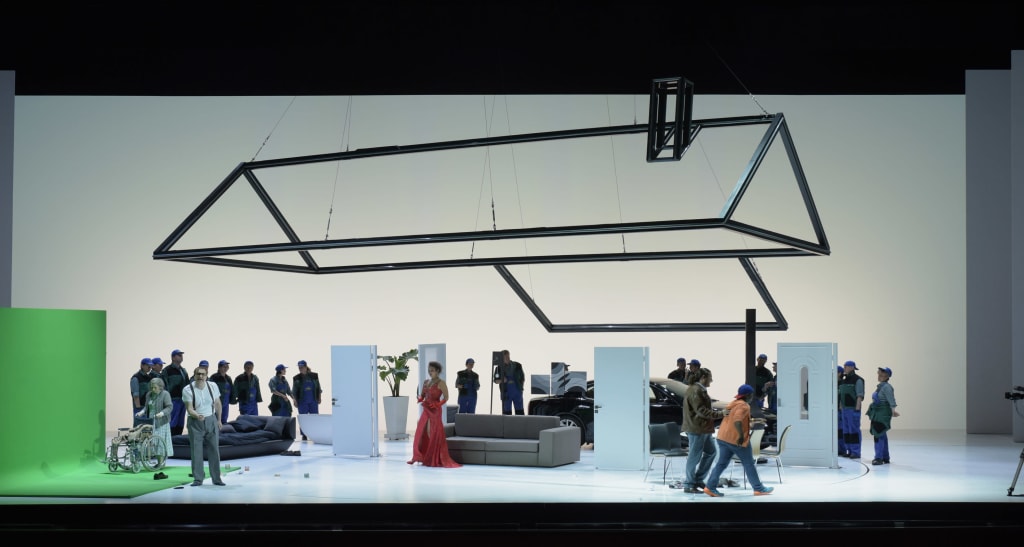Synopsis
Don Pasquale, an old greybeard, decides to take a wife in order to overturn his nephew Ernesto’s plans. Ernesto, however, with the help of Doctor Malatesta, undertakes to ensnare Don Pasquale in the meshes of his own trap, entrusting the role of bride-to-be to Norina, his own betrothed. Docile, then intractable, Norina excels in playing at false appearances. The conflict between the two generations smoulders and stokes the comedy whilst producing an undercurrent of wistful yearning. With sincerity and dramatic profundity, Damiano Michieletto opens a pathway to the heart of an apparently light-hearted work, renowned as the apotheosis of opera buffa.
Duration : 2h35 no interval
Language : Italian
-
Opening
-
First part 80 min
-
Intermission 30 min
-
Second part 45 min
-
End
Artists
Dramma buffo in three acts (1843)
Creative team
Cast
Coproduction avec le Royal Opera House, Covent Garden, Londres
et le teatro Massimo, Palerme
Orchestre et Choeurs de l’Opéra national de Paris
Media
Access and services
Palais Garnier
Place de l'Opéra
75009 Paris
Public transport
Underground Opéra (lignes 3, 7 et 8), Chaussée d’Antin (lignes 7 et 9), Madeleine (lignes 8 et 14), Auber (RER A)
Bus 20, 21, 27, 29, 32, 45, 52, 66, 68, 95, N15, N16
Calculate my routeAt the Palais Garnier, buy €10 tickets for seats in the 6th category (very limited visibility, two tickets maximum per person) on the day of the performance at the Box offices.
In both our venues, discounted tickets are sold at the box offices from 30 minutes before the show:
- €35 tickets for under-28s, unemployed people (with documentary proof less than 3 months old) and senior citizens over 65 with non-taxable income (proof of tax exemption for the current year required)
- €70 tickets for senior citizens over 65
Get samples of the operas and ballets at the Paris Opera gift shops: programmes, books, recordings, and also stationery, jewellery, shirts, homeware and honey from Paris Opera.
Palais Garnier
- Every day from 10:30 a.m. to 6 p.m. and until performances end
- Get in from Place de l’Opéra or from within the theatre’s public areas
- For more information: +33 1 53 43 03 97
Online
Palais Garnier
Place de l'Opéra
75009 Paris
Public transport
Underground Opéra (lignes 3, 7 et 8), Chaussée d’Antin (lignes 7 et 9), Madeleine (lignes 8 et 14), Auber (RER A)
Bus 20, 21, 27, 29, 32, 45, 52, 66, 68, 95, N15, N16
Calculate my routeAt the Palais Garnier, buy €10 tickets for seats in the 6th category (very limited visibility, two tickets maximum per person) on the day of the performance at the Box offices.
In both our venues, discounted tickets are sold at the box offices from 30 minutes before the show:
- €35 tickets for under-28s, unemployed people (with documentary proof less than 3 months old) and senior citizens over 65 with non-taxable income (proof of tax exemption for the current year required)
- €70 tickets for senior citizens over 65
Get samples of the operas and ballets at the Paris Opera gift shops: programmes, books, recordings, and also stationery, jewellery, shirts, homeware and honey from Paris Opera.
Palais Garnier
- Every day from 10:30 a.m. to 6 p.m. and until performances end
- Get in from Place de l’Opéra or from within the theatre’s public areas
- For more information: +33 1 53 43 03 97
Online
You will also like


















































